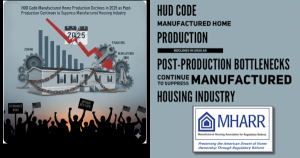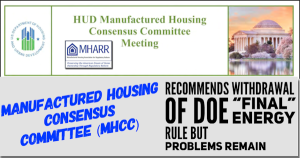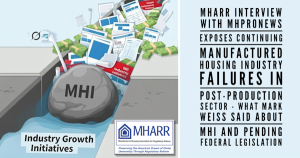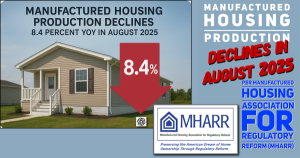Manufactured Housing Association for Regulatory Reform (MHARR) Provides October 2022 Meeting Insights with Senior HUD Officials
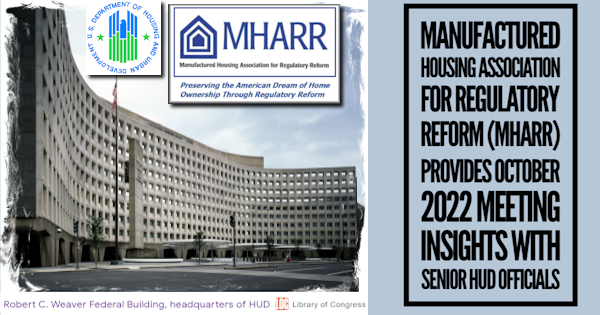
OCTOBER 6, 2022
TO: MHARR MANUFACTURERS
MHARR STATE AFFILIATES
MHARR TECHNICAL REVIEW GROUP (TRG)
FROM: MARK WEISS
RE: MHARR MEETING WITH SENIOR HUD OFFICIALS
MHARR Washington officials met with senior HUD executives regarding manufactured housing program issues on October 3, 2022. The meeting included, among others, HUD Assistant Secretary for Housing/Federal Housing Commissioner, Julia Gordon, HUD Office of Manufactured Housing Programs (OMHP) Administrator, Teresa Payne, and representatives from HUD’s Office of General Counsel (OGC). Addressed during the meeting were multiple pending high-priority issues affecting the manufactured housing industry and American consumers of affordable housing. The matters highlighted by MHARR and addressed during the meeting, are summarized below and will be the subject of ongoing follow-up by MHARR. Further details regarding this interaction with HUD officials will be provided at MHARR’s upcoming Board of Directors meeting.
MHCC REPRESENTATION AND MEETING PROCEDURES
MHARR first raised a longstanding unresolved issue – the imbalance of industry representation on the statutory Manufactured Housing Consensus Committee (MHCC) and MHCC procedures which prevent directly interested parties (including MHARR and others) — who are not MHCC voting members — from participating fully and directly in MHCC meetings and debates concerning vital regulatory issues. Since former MHARR President and CEO Danny Ghorbani’s term as a member of the MHCC ended a number of years ago, HUD has failed to appoint staff representatives of either MHARR or the Manufactured Housing Institute (MHI) to the MHCC. This is directly contrary to an unwritten understanding that HUD and both industry organizations had at the time of the MHCC’s initial organization, and impairs the full and proper representation of the industry’s views during MHCC debates. Ostensibly, the refusal to appoint organizational staff representatives from both associations was premised on an Office of Management and Budget (OMB) ban on the appointment of Registered Federal Lobbyists to federal advisory committees under the Federal Advisory Committees Act (FACA). That ban, however – as MHARR has advised HUD multiple times since — was reversed in 2014 after it was found to be in violation of the First Amendment by a federal court of appeals. As a result, there is no legitimate legal basis for the exclusion of industry organization staff representatives from voting membership on the MHCC, and MHARR urged the Assistant Secretary, as the senior HUD official with direct oversight responsibility for the federal manufactured housing program, to address and rectify this failure.
Beyond voting representation, MHARR also called on HUD to provide, once again, for the direct participation of MHARR and other interested parties in MHCC meetings and debates. Contemporaneously with its ban on MHCC voting representation for the industry’s two national organizations, HUD has also severely restricted the ability of such organizations to participate effectively in MHCC debates of critical issues. These restrictive procedures allow MHCC non-members to address the Committee for only two minutes during “public comment” periods scheduled before and after MHCC debate sessions. As MHARR has long stressed, such pro forma “participation” is:
(1) Too brief and too truncated to thoroughly and effectively address routinely-complex issues;
(2) Too far removed in time from the actual debates to effectively impact those debates;
(3) Too often disconnected from the substance of such debates to effectively address (and potentially resolve) questions and issues as they arise; and
(4) Deprives Committee debates of the extensive knowledge, expertise and institutional memory of MHARR (and other industry organizations) to the detriment of the industry and consumers of affordable housing.
To remedy these significant failures, MHARR called on HUD and its senior leadership to place a staff representative from MHARR (and MHI) on the MHCC as a voting member and to otherwise provide for the full participation of all interested parties during all phases of MHCC meetings and debates, in real-time, and not just during dissociated “public comment” sessions, emphasizing that such participation is routine for other consensus committees relating to construction and safety standards.
PENDING DOE ENERGY STANDARDS AND ENFORCEMENT
MHARR next addressed the pending U.S. Department of Energy (DOE) energy standards for manufactured housing, which are scheduled to go into effect on May 31, 2022. MHARR reiterated its strong opposition to those standards as published emphasizing, once again, that the DOE mandates will increase the retail level price of a double-section manufactured home by $6,000.00 to $12,000.00 and, in the process, exclude millions of Americans from homeownership, contrary to the policies of the Biden Administration. That exclusionary impact, moreover, will have its harshest and most profoundly negative effects on lower-income Americans for whom manufactured housing is the only source of truly affordable homeownership. Again, this degradation of the availability of non-subsidized, affordable homeownership would be directly contrary to Administration policy. Moreover, as MHARR emphasized, the full cost – and full exclusionary impact — of the DOE energy standards is not even known, because DOE has yet to propose an enforcement mechanism for the new standards, meaning that regulatory compliance, testing and enforcement costs remain entirely unknown.
MHARR also raised DOE’s failure to fully and properly consult with HUD regarding the proposed and final energy standards. MHARR emphasized that DOE should have involved HUD and the MHCC in the development of those standards from the outset, in order to ensure their consistency with the unique construction and affordability of manufactured housing, as required by applicable law. Instead, though, as MHARR has pointed out on numerous occasions, DOE only consulted with HUD and the MHCC as an afterthought, to provide procedural updates on activity that was already occurring, instead of involving both entities on an organic level in the development of appropriate standards that would maintain the inherent, non-subsidized affordability of HUD Code manufactured housing.
Because of these multiple failures, MHARR advised HUD that court action to enjoin the DOE standards is entirely possible. Regardless of any such industry court action, however, and given the fact that DOE essentially excluded any meaningful HUD/MHCC input from the rulemaking process by not involving both at an elemental level from the very outset of the standards development process, MHARR urged HUD to:
(1) Exercise extreme caution and not rush into-effect energy standards that will cause extreme harm to the industry and consumers;
(2) Take all possible administrative steps to ameliorate the extreme cost and exclusionary impacts of the DOE standards;
(3) Provide for an enforcement/compliance date based on the five-year timeframe already recommended by the MHCC (if not more) to provide HUD Code manufacturers with a reasonable opportunity to adapt to the new criteria; and
(4) provide for enforcement of the energy standards as part of the HUD compliance system, rather than through a separate enforcement mechanism.
While MHARR has – and will continue to — aggressively oppose the DOE energy standards, as shown by its pledge to participate in and support industry litigation to invalidate those standards, any such standards should fall within the oversight and enforcement responsibility of HUD as a housing agency, rather than the “climate” ideologues and energy interests that dominate DOE.
PENDING CONDITIONAL SPRINKLER STANDARD
MHARR reiterated its longstanding opposition to the inclusion of any fire sprinkler standard in the HUD Code. While HUD, in its most recent set of proposed federal manufactured housing standards included a “voluntary” or “conditional” fire sprinkler standard for manufacturers that choose to include a sprinkler system in a manufactured home, MHARR stressed that such a standard is not necessary, has no valid basis, and could ultimately lead to a mandatory sprinkler requirement that would needlessly increase the cost of manufactured housing and spawn multiple devastating impacts including frivolous lawsuits involving communities that may lack sufficient water reserves for such systems.
MHARR pointed the Assistant Secretary to its August 22, 2022 written comments in the HUD rulemaking, which set forth its opposition to a sprinkler standard in detail. Among other things, MHARR has long maintained that the existing HUD fire safety standards (without a specific sprinkler standard) should federally preempt any state and local sprinkler mandates, because the federal manufactured housing standards already ensure reasonable fire safety for inhabitants. This is illustrated by National Fire Protection Association (NFPA) data showing that current HUD Code manufactured homes are as safe, or safer, than site-built homes in all major fire safety measurement categories, including fire deaths, injuries and property damage. Given that the existing federal standards already meet the goals, objectives and purposes of governing federal law, there should be no room for states and/or localities to impose additional cost burdens on manufactured home owners for their own insular purposes. Accordingly, any such state or local mandates should be preempted under the “broad and liberal” preemption standard of the 2000 Reform Law. A voluntary federal fire sprinkler standard, accordingly, is not needed to achieve federal preemption.
Moreover, there is no need to incorporate a federal sprinkler standard in the HUD Code, because a “voluntary” sprinkler standard – NFPA 13D – already exists and has been used successfully by HUD Code manufacturers to satisfy state and/or local sprinkler mandates. This satisfies the goals and objectives of state and local government, industry members and consumers without the risk of incorporating an unnecessary sprinkler standard in the HUD Code, which both history and experience show would be likely to morph, ultimately, into a mandatory standard subject to Subpart I and related enforcement by HUD’s ostensible “monitoring” contractor.
EXCLUSIONARY ZONING PREEMPTION
In addition to the foregoing regulatory issues, MHARR also urged the Assistant Secretary and HUD to take an aggressive position against state and local zoning mandates which exclude or otherwise discriminate against affordable manufactured housing and the lower and moderate-income Americans who rely the most on inherently affordable HUD Code homes. Likening such exclusion to the practices targeted by HUD’s Affirmatively Furthering Fair Housing (AFFH) initiative (which specifically empowers HUD to target zoning restrictions which contribute to patterns of housing discrimination), MHARR called on HUD to use the express (and broad) enhanced federal preemption of the 2000 Reform Law to target the repeal and/or invalidation of such exclusionary zoning mandates which, as documented by multiple housing researchers, needlessly increase the cost of housing and homeownership in communities and either promote or reinforce patterns of racial and economic discrimination.
MH CONSUMER FINANCING
MHARR also addressed the issue of manufactured home consumer financing and the need for expanded access to – and availability of – such financing. Given that the Assistant Secretary is also FHA Commissioner, MHARR specifically addressed FHA’s Title I manufactured housing program and Ginnie Mae’s “10-10” rule. Beyond thanking the Assistant Secretary for the recent Request for Information (RFI) published by Ginnie Mae (a HUD sub-agency) with respect to the Title I program, MHARR stressed the need to revitalize that program through the elimination of the “10-10” policy, which has effectively decimated the Title I program since its adoption in 2010. MHARR emphasized that the exclusion of significant numbers of lenders from the Title I program through, and as a result of the 10-10 rule, has increased, expanded and perpetuated the market dominance of a small group of portfolio lenders. This, in turn, has resulted in higher interest rates than would be the case for a fully competitive market with both public (i.e., FHA/Ginnie Mae) and private (i.e., Fannie Mae and Freddie Mac) support, which have either excluded lower income purchasers from the HUD Code market or unnecessarily increased the cost of purchasing a HUD Code home. Based on all this, MHARR encouraged the Commissioner to follow through on the RFI and adopt new/modified qualification criteria for Title manufactured housing lenders that would encourage greater and higher levels of participation for the benefit of American consumers of affordable housing.
HUD “MONITORING” CONTRACT
MHARR also raised the issue of HUD’s use of the same contracting entity (albeit with different corporate names) since the inception of the federal manufactured housing program nearly 50 years ago, its failure to obtain (or arguably seek) full and fair competition for that contract as required by federal law, and the need for HUD to fully comply with the competitive requirements of federal contracting law with respect to the monitoring contract going forward. MHARR stressed, as it has previously, that HUD’s de facto sole source procurement of the program monitoring contract – from the very inception of the manufactured housing program — is baseless, unjustifiable and beyond any conceivable need or justification. Such solicitations, in the future, should and must be conducted based on full, fair and proper competition in accordance with all applicable law.
cc: Other Interested HUD Code Manufactured Housing Industry Members
Manufactured Housing Association for Regulatory Reform (MHARR)
1331 Pennsylvania Ave N.W., Suite 512
Washington D.C. 20004
Phone: 202/783-4087
Fax: 202/783-4075
Email: MHARR@MHARRPUBLICATIONS.COM
Website: manufacturedhousingassociation.org

OCTOBER 6, 2022
TO: MHARR MANUFACTURERS
MHARR STATE AFFILIATES
MHARR TECHNICAL REVIEW GROUP (TRG)
FROM: MARK WEISS
RE: MHARR MEETING WITH SENIOR HUD OFFICIALS
MHARR Washington officials met with senior HUD executives regarding manufactured housing program issues on October 3, 2022. The meeting included, among others, HUD Assistant Secretary for Housing/Federal Housing Commissioner, Julia Gordon, HUD Office of Manufactured Housing Programs (OMHP) Administrator, Teresa Payne, and representatives from HUD’s Office of General Counsel (OGC). Addressed during the meeting were multiple pending high-priority issues affecting the manufactured housing industry and American consumers of affordable housing. The matters highlighted by MHARR and addressed during the meeting, are summarized below and will be the subject of ongoing follow-up by MHARR. Further details regarding this interaction with HUD officials will be provided at MHARR’s upcoming Board of Directors meeting.
MHCC REPRESENTATION AND MEETING PROCEDURES
MHARR first raised a longstanding unresolved issue – the imbalance of industry representation on the statutory Manufactured Housing Consensus Committee (MHCC) and MHCC procedures which prevent directly interested parties (including MHARR and others) — who are not MHCC voting members — from participating fully and directly in MHCC meetings and debates concerning vital regulatory issues. Since former MHARR President and CEO Danny Ghorbani’s term as a member of the MHCC ended a number of years ago, HUD has failed to appoint staff representatives of either MHARR or the Manufactured Housing Institute (MHI) to the MHCC. This is directly contrary to an unwritten understanding that HUD and both industry organizations had at the time of the MHCC’s initial organization, and impairs the full and proper representation of the industry’s views during MHCC debates. Ostensibly, the refusal to appoint organizational staff representatives from both associations was premised on an Office of Management and Budget (OMB) ban on the appointment of Registered Federal Lobbyists to federal advisory committees under the Federal Advisory Committees Act (FACA). That ban, however – as MHARR has advised HUD multiple times since — was reversed in 2014 after it was found to be in violation of the First Amendment by a federal court of appeals. As a result, there is no legitimate legal basis for the exclusion of industry organization staff representatives from voting membership on the MHCC, and MHARR urged the Assistant Secretary, as the senior HUD official with direct oversight responsibility for the federal manufactured housing program, to address and rectify this failure.
Beyond voting representation, MHARR also called on HUD to provide, once again, for the direct participation of MHARR and other interested parties in MHCC meetings and debates. Contemporaneously with its ban on MHCC voting representation for the industry’s two national organizations, HUD has also severely restricted the ability of such organizations to participate effectively in MHCC debates of critical issues. These restrictive procedures allow MHCC non-members to address the Committee for only two minutes during “public comment” periods scheduled before and after MHCC debate sessions. As MHARR has long stressed, such pro forma “participation” is:
(1) Too brief and too truncated to thoroughly and effectively address routinely-complex issues;
(2) Too far removed in time from the actual debates to effectively impact those debates;
(3) Too often disconnected from the substance of such debates to effectively address (and potentially resolve) questions and issues as they arise; and
(4) Deprives Committee debates of the extensive knowledge, expertise and institutional memory of MHARR (and other industry organizations) to the detriment of the industry and consumers of affordable housing.
To remedy these significant failures, MHARR called on HUD and its senior leadership to place a staff representative from MHARR (and MHI) on the MHCC as a voting member and to otherwise provide for the full participation of all interested parties during all phases of MHCC meetings and debates, in real-time, and not just during dissociated “public comment” sessions, emphasizing that such participation is routine for other consensus committees relating to construction and safety standards.
PENDING DOE ENERGY STANDARDS AND ENFORCEMENT
MHARR next addressed the pending U.S. Department of Energy (DOE) energy standards for manufactured housing, which are scheduled to go into effect on May 31, 2022. MHARR reiterated its strong opposition to those standards as published emphasizing, once again, that the DOE mandates will increase the retail level price of a double-section manufactured home by $6,000.00 to $12,000.00 and, in the process, exclude millions of Americans from homeownership, contrary to the policies of the Biden Administration. That exclusionary impact, moreover, will have its harshest and most profoundly negative effects on lower-income Americans for whom manufactured housing is the only source of truly affordable homeownership. Again, this degradation of the availability of non-subsidized, affordable homeownership would be directly contrary to Administration policy. Moreover, as MHARR emphasized, the full cost – and full exclusionary impact — of the DOE energy standards is not even known, because DOE has yet to propose an enforcement mechanism for the new standards, meaning that regulatory compliance, testing and enforcement costs remain entirely unknown.
MHARR also raised DOE’s failure to fully and properly consult with HUD regarding the proposed and final energy standards. MHARR emphasized that DOE should have involved HUD and the MHCC in the development of those standards from the outset, in order to ensure their consistency with the unique construction and affordability of manufactured housing, as required by applicable law. Instead, though, as MHARR has pointed out on numerous occasions, DOE only consulted with HUD and the MHCC as an afterthought, to provide procedural updates on activity that was already occurring, instead of involving both entities on an organic level in the development of appropriate standards that would maintain the inherent, non-subsidized affordability of HUD Code manufactured housing.
Because of these multiple failures, MHARR advised HUD that court action to enjoin the DOE standards is entirely possible. Regardless of any such industry court action, however, and given the fact that DOE essentially excluded any meaningful HUD/MHCC input from the rulemaking process by not involving both at an elemental level from the very outset of the standards development process, MHARR urged HUD to:
(1) Exercise extreme caution and not rush into-effect energy standards that will cause extreme harm to the industry and consumers;
(2) Take all possible administrative steps to ameliorate the extreme cost and exclusionary impacts of the DOE standards;
(3) Provide for an enforcement/compliance date based on the five-year timeframe already recommended by the MHCC (if not more) to provide HUD Code manufacturers with a reasonable opportunity to adapt to the new criteria; and
(4) provide for enforcement of the energy standards as part of the HUD compliance system, rather than through a separate enforcement mechanism.
While MHARR has – and will continue to — aggressively oppose the DOE energy standards, as shown by its pledge to participate in and support industry litigation to invalidate those standards, any such standards should fall within the oversight and enforcement responsibility of HUD as a housing agency, rather than the “climate” ideologues and energy interests that dominate DOE.
PENDING CONDITIONAL SPRINKLER STANDARD
MHARR reiterated its longstanding opposition to the inclusion of any fire sprinkler standard in the HUD Code. While HUD, in its most recent set of proposed federal manufactured housing standards included a “voluntary” or “conditional” fire sprinkler standard for manufacturers that choose to include a sprinkler system in a manufactured home, MHARR stressed that such a standard is not necessary, has no valid basis, and could ultimately lead to a mandatory sprinkler requirement that would needlessly increase the cost of manufactured housing and spawn multiple devastating impacts including frivolous lawsuits involving communities that may lack sufficient water reserves for such systems.
MHARR pointed the Assistant Secretary to its August 22, 2022 written comments in the HUD rulemaking, which set forth its opposition to a sprinkler standard in detail. Among other things, MHARR has long maintained that the existing HUD fire safety standards (without a specific sprinkler standard) should federally preempt any state and local sprinkler mandates, because the federal manufactured housing standards already ensure reasonable fire safety for inhabitants. This is illustrated by National Fire Protection Association (NFPA) data showing that current HUD Code manufactured homes are as safe, or safer, than site-built homes in all major fire safety measurement categories, including fire deaths, injuries and property damage. Given that the existing federal standards already meet the goals, objectives and purposes of governing federal law, there should be no room for states and/or localities to impose additional cost burdens on manufactured home owners for their own insular purposes. Accordingly, any such state or local mandates should be preempted under the “broad and liberal” preemption standard of the 2000 Reform Law. A voluntary federal fire sprinkler standard, accordingly, is not needed to achieve federal preemption.
Moreover, there is no need to incorporate a federal sprinkler standard in the HUD Code, because a “voluntary” sprinkler standard – NFPA 13D – already exists and has been used successfully by HUD Code manufacturers to satisfy state and/or local sprinkler mandates. This satisfies the goals and objectives of state and local government, industry members and consumers without the risk of incorporating an unnecessary sprinkler standard in the HUD Code, which both history and experience show would be likely to morph, ultimately, into a mandatory standard subject to Subpart I and related enforcement by HUD’s ostensible “monitoring” contractor.
EXCLUSIONARY ZONING PREEMPTION
In addition to the foregoing regulatory issues, MHARR also urged the Assistant Secretary and HUD to take an aggressive position against state and local zoning mandates which exclude or otherwise discriminate against affordable manufactured housing and the lower and moderate-income Americans who rely the most on inherently affordable HUD Code homes. Likening such exclusion to the practices targeted by HUD’s Affirmatively Furthering Fair Housing (AFFH) initiative (which specifically empowers HUD to target zoning restrictions which contribute to patterns of housing discrimination), MHARR called on HUD to use the express (and broad) enhanced federal preemption of the 2000 Reform Law to target the repeal and/or invalidation of such exclusionary zoning mandates which, as documented by multiple housing researchers, needlessly increase the cost of housing and homeownership in communities and either promote or reinforce patterns of racial and economic discrimination.
MH CONSUMER FINANCING
MHARR also addressed the issue of manufactured home consumer financing and the need for expanded access to – and availability of – such financing. Given that the Assistant Secretary is also FHA Commissioner, MHARR specifically addressed FHA’s Title I manufactured housing program and Ginnie Mae’s “10-10” rule. Beyond thanking the Assistant Secretary for the recent Request for Information (RFI) published by Ginnie Mae (a HUD sub-agency) with respect to the Title I program, MHARR stressed the need to revitalize that program through the elimination of the “10-10” policy, which has effectively decimated the Title I program since its adoption in 2010. MHARR emphasized that the exclusion of significant numbers of lenders from the Title I program through, and as a result of the 10-10 rule, has increased, expanded and perpetuated the market dominance of a small group of portfolio lenders. This, in turn, has resulted in higher interest rates than would be the case for a fully competitive market with both public (i.e., FHA/Ginnie Mae) and private (i.e., Fannie Mae and Freddie Mac) support, which have either excluded lower income purchasers from the HUD Code market or unnecessarily increased the cost of purchasing a HUD Code home. Based on all this, MHARR encouraged the Commissioner to follow through on the RFI and adopt new/modified qualification criteria for Title manufactured housing lenders that would encourage greater and higher levels of participation for the benefit of American consumers of affordable housing.
HUD “MONITORING” CONTRACT
MHARR also raised the issue of HUD’s use of the same contracting entity (albeit with different corporate names) since the inception of the federal manufactured housing program nearly 50 years ago, its failure to obtain (or arguably seek) full and fair competition for that contract as required by federal law, and the need for HUD to fully comply with the competitive requirements of federal contracting law with respect to the monitoring contract going forward. MHARR stressed, as it has previously, that HUD’s de facto sole source procurement of the program monitoring contract – from the very inception of the manufactured housing program — is baseless, unjustifiable and beyond any conceivable need or justification. Such solicitations, in the future, should and must be conducted based on full, fair and proper competition in accordance with all applicable law.
cc: Other Interested HUD Code Manufactured Housing Industry Members
Manufactured Housing Association for Regulatory Reform (MHARR)
1331 Pennsylvania Ave N.W., Suite 512
Washington D.C. 20004
Phone: 202/783-4087
Fax: 202/783-4075
Email: MHARR@MHARRPUBLICATIONS.COM
Website: manufacturedhousingassociation.org


